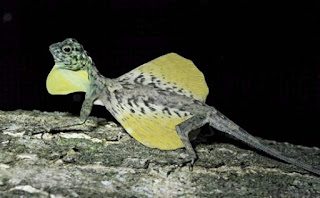Cekibar village.
Cekibar village is a type of lizard fly often found in Java. These lizards are known by the scientific name Draco Volans Linnaeus, 1758. Local names are cekibar (Betawi), hap-hap (Sunda), and celeret Gombel or klarap (Java). In English is called gliding lizard or a dragon fly.These animals spread from Thailand and the Malay peninsula in the west; Philippine Islands in the north; Sumatra, Mentawai, Riau, Natuna, Borneo, Java, Nusa Tenggara, Sulawesi, Maluku to the east.
Characteristics.
The size is rather small lizards, the total length up to 200 mm. Patagium ('wings') in the form of an extension of six pairs of ribs covered with leather. Top side patagium yellow to orange, black stained. The down side yellowish gray, with black spots.Bumpy in the head, elbow-faceted and wrinkled like an old man; with a yellow chin pouch (male) or blue (females), and a pair of leather Sibir on both sides of the neck. Small crown Rigi, located on the back side of the head. Agamid typical lizard eye, with thick protruding eyelids.
Back (upper body) blackish brown or grayish, color can be darker or lighter when disturbed. Throughout the vertebrae (spine) there is a pattern of black spots on the usual location: on the crown, back of the head, neck, and then enlarged and turned into a brownish black circle pattern at three points on the back (spine) and one at the base of the tail, This type of color pattern is a good pseudonym bark.
Ventral (bottom side of the body) gray-whitish, slightly greenish in the medial (midline of the body); with brown dots in the lateral direction (side edge of the body). Tail about 1 ½ times the length of the body; striped in the end, with a scale that makes it seem more powerful in terms of air-side keel.
Habit.
Cekibar village commonly found in the yard, garden, secondary forest. Often these animals were observed hunting insects in bark-cabanarnog branch to the tree. Sometimes cekibar move by means of 'fly', ie jump and float from one tree to another.In the breeding season, often encountered several men chasing women in the same tree. Storing eggs in the soil or humus at the base of the tree; women dig with muzzle.
Klarap.
One of the occupants in the coffee plantation is klarap lizard. Klarap it is a small lizard that lives at the base of a large tree. Klarap are predators that feed on insects in the garden. Klarap eat grasshoppers, crickets and other insects. When threatened by other creatures, klarap Bias drift avoid flying from tree to another. Usually klarap a stay in the tree itself and other klarap live another tree. Males have a "flag" yellow form of skin that are usually folded in front of the neck. When klarap a warning or a threat to klarap in another tree, klarap open "flag" it and show it in order not to be attacked by competitors from other trees. Klarap invertebrates such an important predator in the garden. Predators that feed on insects during the day, can reduce the number of insects, including some coffee pests. Thank you for reading this article.Written and posted by Bambang Sunarno. sunarnobambang86@gmail.com
Author:
http://shema.org/Personal.
https://plus.google.com/105319704331231770941.
name: Bambang Sunarno.
http://primadonablog.blogspot.com/2015/06/you-know-gecko-fly.html
DatePublished: June 1, 2015 at 12:30


